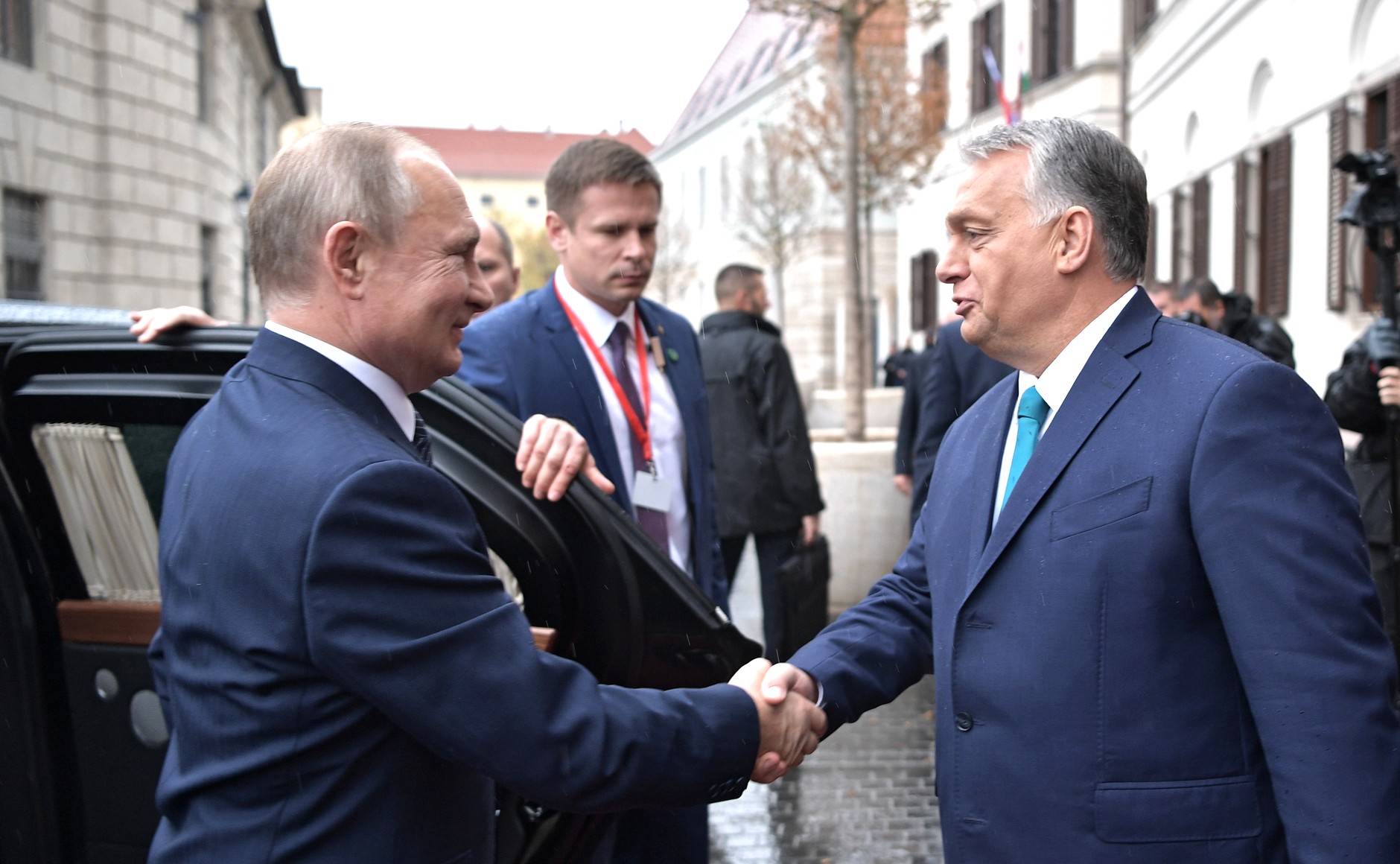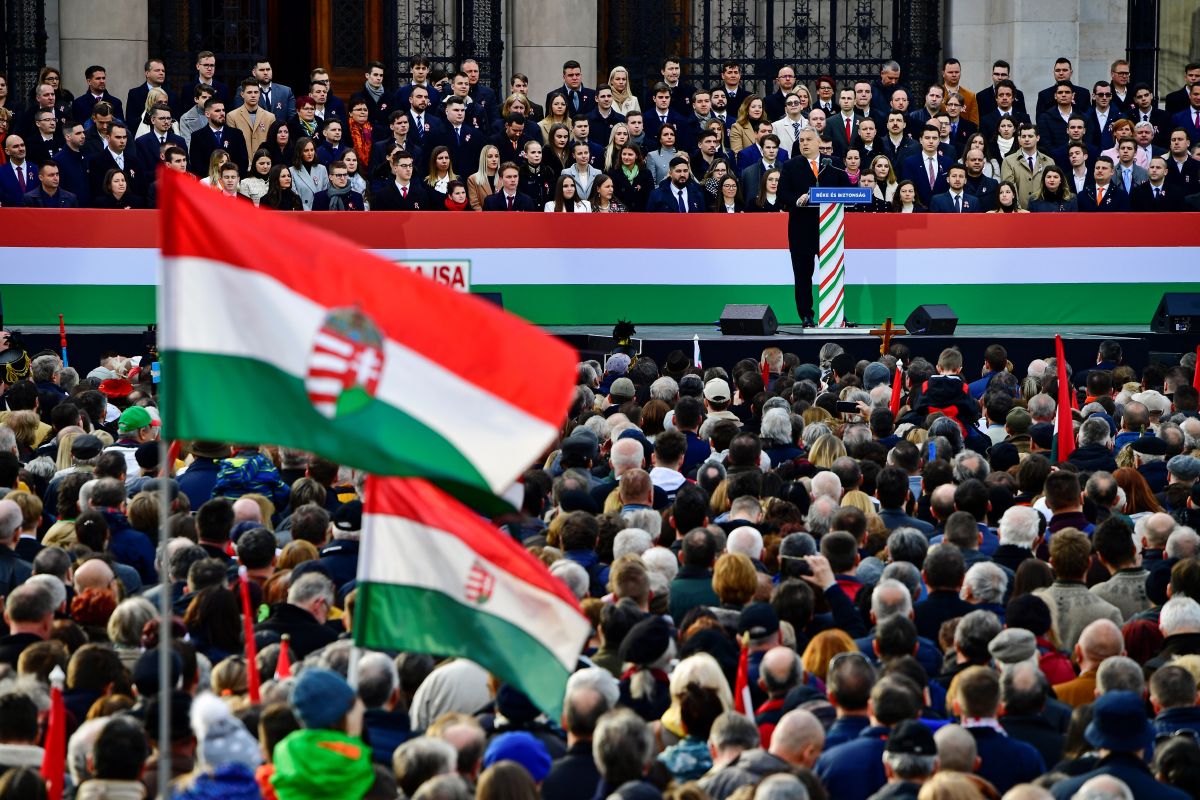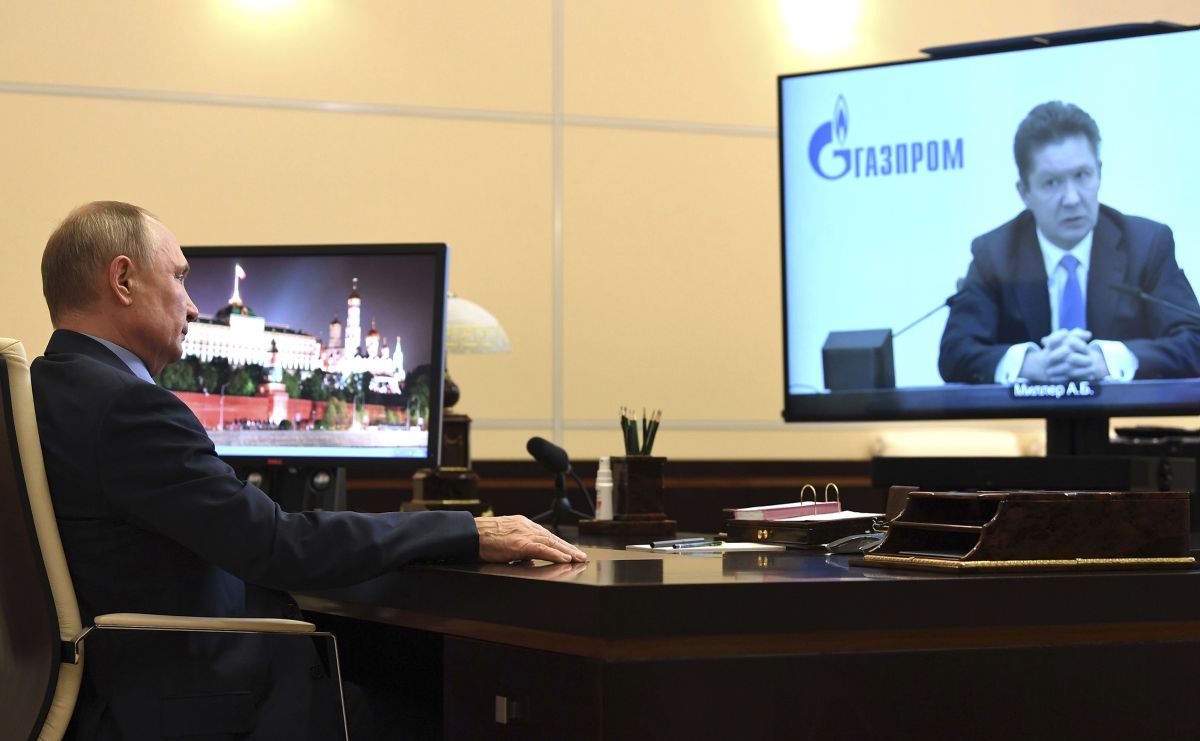Prospects for the Diversification of Natural Gas and Oil Supply Sources to Hungary
The Hungarian government opposes the imposition of EU sanctions on the import of energy resources—especially gas—from Russia. The authorities explain this decision with Hungary’s high level of dependence on these resources and lack of alternative sources that are not more expensive. In fact, this stance is a consequence of Hungary’s long-standing policy towards Russia of closer political relations and energy cooperation since 2010, and the related lack of investment in the diversification of energy sources. Even if there is political will, which the authorities have not shown so far, it will be difficult for Hungary to free itself from Russian gas in the short term. The possibilities of giving up Russian oil are higher, but Hungary is unlikely to support an embargo on it this year.
 Kremlin Pool/ Russian Look/ FORUM
Kremlin Pool/ Russian Look/ FORUM
The main objective of Viktor Orbán’s government with regard to the war in Ukraine, in which Hungary de facto supports Russia, apart from ensuring the security of the state, remains minimising its financial impact. This explains the government’s stance, expressed by, among others, Foreign Minister Péter Szijjártó that Hungary “does not want to bear the costs of the war”. The related discussion of an embargo on Russian gas is seen by the government as “pointless due to the lack of viable alternatives” even in the medium term. According to the government, a move away from Russian gas could take decades, which is why it favours maintaining pragmatic economic cooperation with Russia, including meeting its demand to pay for gas in roubles. After Germany declared on 20 April that it would move away from Russian oil by the end of 2022, the Hungarian authorities did not rule out supporting an EU embargo on this commodity. However, they also have not given a deadline for a possible opt-out or conditions for consent.
Security of Gas and Oil Supplies to Hungary
For more than a decade, consecutive Orbán governments have focused on diversifying the routes rather than the sources of gas supply to Hungary. This has been a political decision with consideration of price above all and driven by the belief that Russia is a reliable economic and political partner. For this reason, the dependency on Russian gas has not decreased during this period and sits at about 85% of annual demand. Hungary’s annual gas consumption in 2020 was 10 billion cubic metres (bcm). It is mainly transported from Russia under a 15-year contract signed in October 2021 and bypassing Ukraine through the Hungarian-Serbian interconnector linked to the Turk Stream pipeline and through the interconnector on the Hungarian-Austrian border. Prior to Orbán’s meeting with Russia’s Vladimir Putin in February 2022, Hungary expressed a desire to increase the amount of gas purchased from Russia and received via Serbia about 1 bcm per year. Hungary also buys 1 bcm of gas (most of it also from Russia) through the Croatian LNG terminal on Krk Island and produces an additional 1 bcm per year from its own, depleting fields.
After 2010, Hungary had ambitions to become a regional gas hub. The supply of gas to neighbouring countries was to be supported by, among other things, its large gas storage capacity (over 6 bcm), significantly exceeding Hungary’s own needs. The greatest progress in the gas sector has been made in the availability of interconnectors. Hungary has connections with bi-directional capacity at the borders with Austria, Croatia, Serbia, Romania, Ukraine, and Slovakia. In addition, the EU is supporting the construction of a pipeline between Italy, Slovenia, and Hungary.
Hungary’s dependence on Russian oil is lower and amounts to about 70%, with the remaining demand ensured by domestic production and supplies via the Adria pipeline from the Croatian oil terminal. Russia transports oil to Hungary mainly via the southern branch of the Druzhba pipeline.
Alternatives
Hungary has limited options for gas supply diversification in the short term. It is holding talks with Azerbaijan on importing 1-2 bcm of gas annually from the end of 2023. Increasing imports using the Croatian terminal on Krk Island is limited by the lack of spare capacity as terminal utilisation is around 90%. Croatia is considering increasing its regasification capacity, but only slightly. Meanwhile, thanks to the construction of the Polish-Slovak interconnector, Hungary can import gas from Poland and Lithuania (up to 4.5 bcm) by the end of this year. However, the high level of utilisation of the terminal in Świnoujście and Klaipeda means that only the planned increase in regasification capacity of the Świnoujście gas port (from 6.1 to 8.3 bcm from 2024) and the construction of a new terminal in the Gulf of Gdańsk (6-12 bcm from 2028) will enable Hungary to import significant amounts of gas from that direction. Also, the possibility of importing from Romania, which plans to achieve gas self-sufficiency from 2027 and export surpluses of gas, is a prospect of at least a few years’ wait. The existing infrastructure allows the flow of up to 3 bcm of gas annually from Romania. Before that, Hungary could import gas from this direction from the terminal under construction in Alexandroupolis, Greece, (from 2023) and from the planned East Med pipeline from Israel to Greece.
At the same time, Hungary has significant potential to reduce its gas demand. About half of its consumption comes in the households and service sectors. Reducing consumption can be achieved in the short term by reducing the temperature in homes and commercial facilities, and in 2-5 years by investing in heat pumps or in photovoltaic panels, the latter already largely subsidised by the government, and improving the energy efficiency of residential buildings. Only 3.6% of buildings in Hungary meet EU requirements, compared to the Union-wide average of 25%. Accelerating investment in nuclear, renewable, and geothermal energy also would help reduce demand. However, dependence on Russian nuclear fuel and technology remains a challenge. Furthermore, due to the low nationwide demand for gas in the power sector (around 20%), investments in the area of individual customers are the priority.
Refineries in Hungary and Slovakia, which belong to the Hungarian oil company MOL, may completely abandon oil supplies from Russia. An alternative to the Druzhba pipeline are deliveries from the oil terminal in Omišalj, Croatia. The Hungarian government and company representatives explain that currently the refinery in Százhalombatta can process a maximum of 35% of non-Russian oil due to its technological limitations, and its complete replacement would require new investments over two to four years. The key problem, though, is the additional costs that would be incurred by the company. Oil from the Croatian terminal probably would be more expensive than Russian oil and its processing would result in products with different parameters than those currently produced.
Conclusions and Prospects
The diversification of energy supply sources for Hungary will be a long and costly process due to deliberate decisions of successive governments, including the Fidesz governments, which were not engaged in seeking alternatives. However, a political decision is needed first and foremost to initiate action in this direction. Statements by Hungarian decision-makers indicate a limited willingness to look for alternatives, especially in the case of natural gas supplies, even in the face of the Russian aggression against Ukraine and EU pressure to reduce dependence on Russia. Such solutions do not appear in the political discourse as even a long-term option. This is a continuation of Hungary’s mercantile approach to energy, which considers only the price of commodities, disregarding security considerations and regional solidarity.
Hungary is unlikely to agree to an embargo on Russian gas, or even to the idea of joint EU gas purchases. In the short term, there is little chance to change this position. It may be softened in the next few years if large-scale investments in energy efficiency and alternative energy sources that would reduce the country’s need for gas are made quickly. However, these would require political will, which Hungary has so far failed to show.
Hungary is more likely to support sanctions on Russian oil, especially if they were to be introduced gradually and with EU compensation for the most affected countries. This would allow MOL to make investments in its refineries, while at the same time enjoying (in the event of a gradual reduction in supplies from Russia) a premium for processing cheaper Russian oil. The chances of Hungary supporting a complete embargo on Russian oil this year are, however, slim due to the time-consuming nature of these investments. If the Hungarians decide to block it and Poland on its own stops buying oil from Russia, this would be costly for Polish energy companies because Hungary then would have the opportunity to produce cheaper oil products that would compete with Polish ones on foreign markets.






